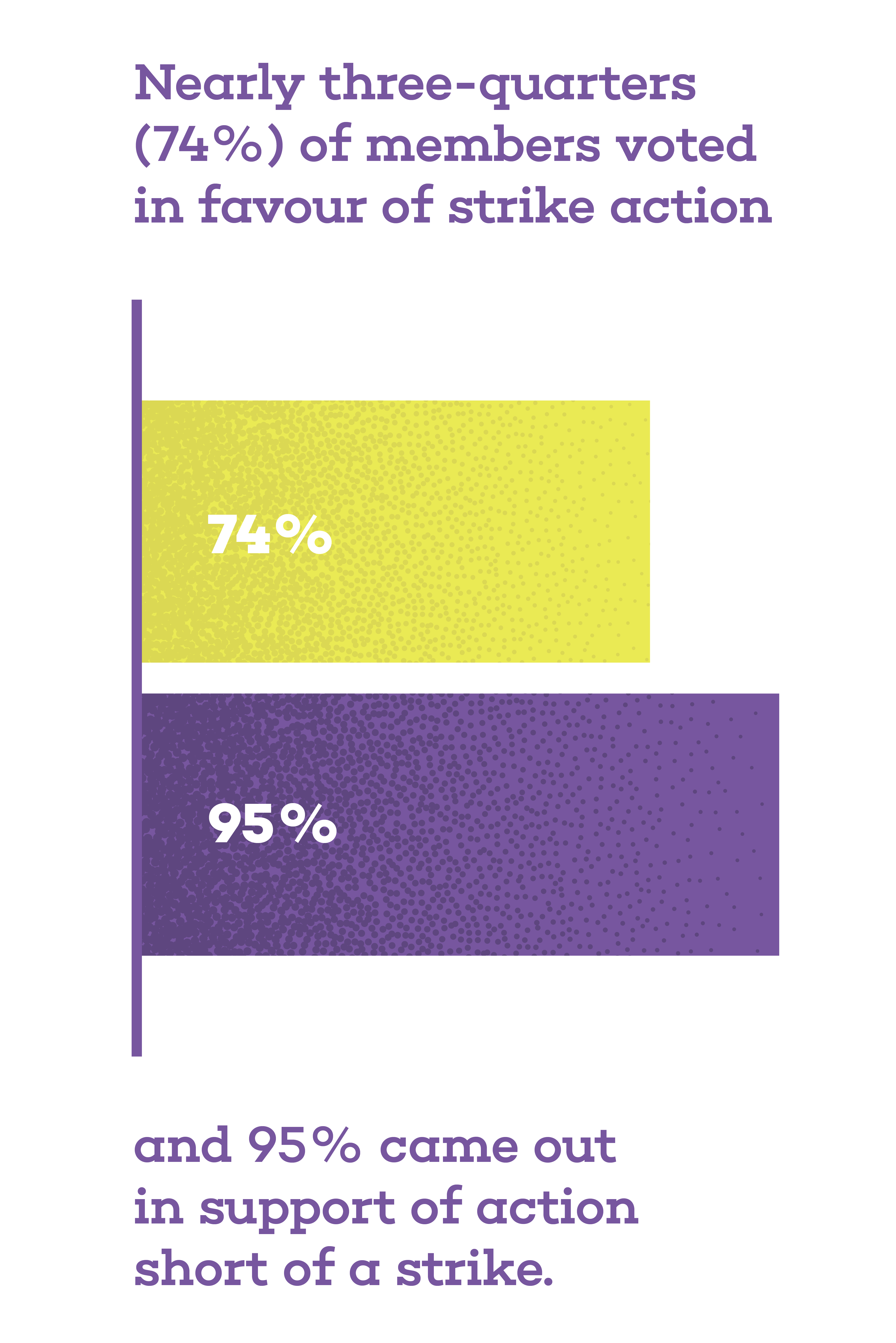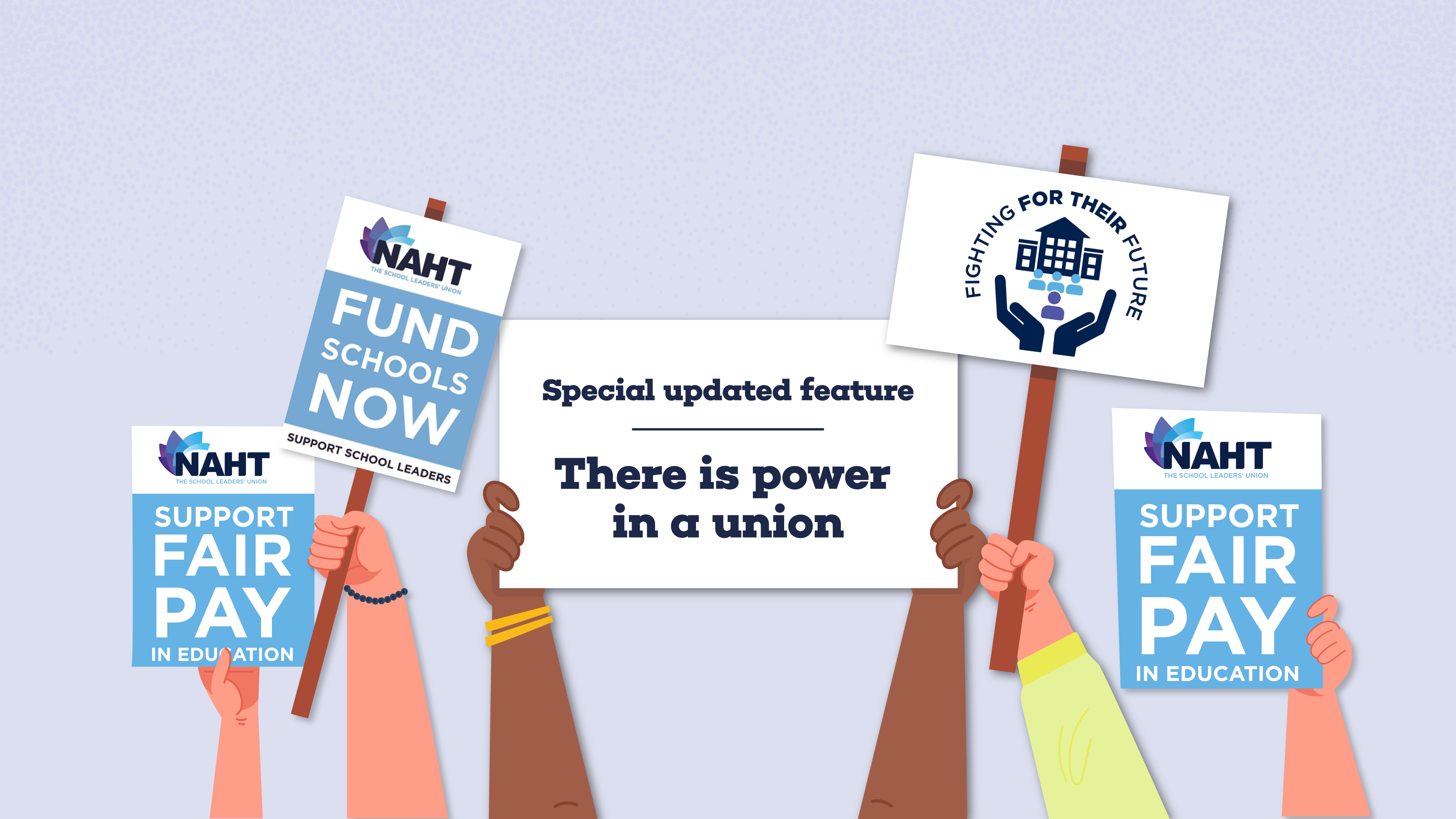
For this special extra online feature, Leadership Focus journalist Nic Paton speaks to NAHT staff about what's next following the results of the ballots in England, plus an update on the situations in Jersey, Northern Ireland and Wales.
She’s unlikely to admit it publicly, but education secretary Gillian Keegan is probably mightily relieved as we head into this autumn’s cycle of party political conferences.
The grim prospect for the Conservatives of having to gather in Manchester at the beginning of October against the backdrop of all four teaching unions taking strike action in England was a very real one.
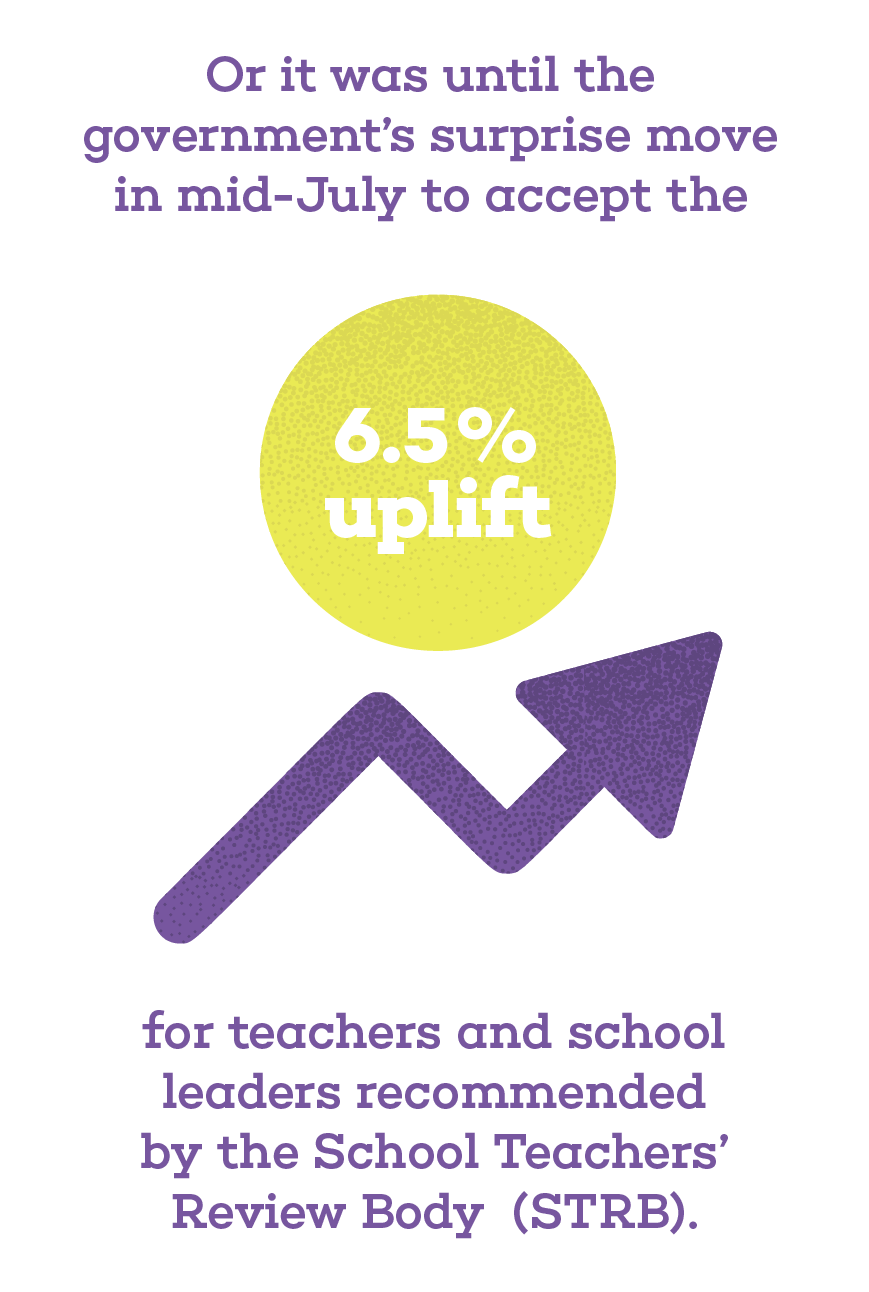
The key that unlocked things – and by all accounts after a considerable behind-doors battle between Keegan and the Treasury – was the acceptance within Whitehall that at least some new money needed to be put on the table as part of any refreshed offer ... even if schools will still have to find more than half (3.5%) of the uplift from existing budgets.
The result was that when the offer was put by NAHT to an online ballot in July, 85% of members voted to accept it, and industrial action was averted – at least for now.

PAUL WHITEMAN
NAHT GENERAL SECRETARY
However, as NAHT general secretary Paul Whiteman makes clear, if Keegan and the Department for Education (DfE) take from this that teachers and school leaders have somehow ‘blinked’ at the first sign of the government putting its hand in its pocket, they are very much mistaken.
This is because in the separate postal ballot on strike action that had been running since May – so initially before the offer was made – members made it very clear that without significant long-term change on pay, inspection and accountability, workload, and recruitment and retention, we may yet find ourselves back in a situation where battle lines are being drawn.
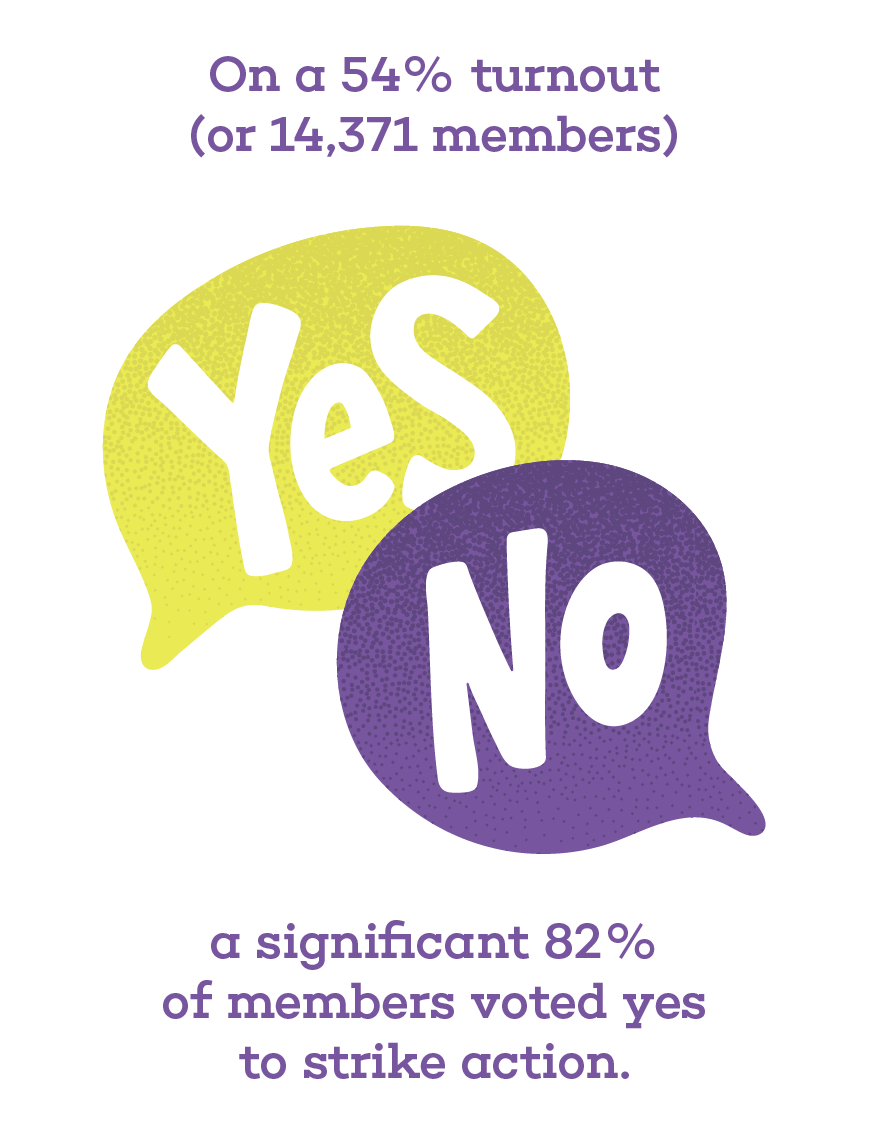
“It is really interesting because the dynamics have changed,” Paul tells Leadership Focus. “The government has always been able to rely on the fact that school leaders are, as we often like to say, ‘relentlessly reasonable’.
“We are always trying to find the solution. We carry on no matter what; we soak up the pressure. Senior leaders have never really been tested to the point where they would turn around and say, ‘Up with this, we will no longer put’.
“But, in the postal ballot, we have now crossed that emotional Rubicon and the government needs to take that very, very seriously. If the government has been successful in one thing, it has been in uniting the four education unions.
“I think that united front will continue now, beyond the immediate dispute, and I think that also needs to be taken seriously by the government,” he warns.
The government’s offer has, yes, been welcome, both in its substance and in the fact that it averts the prospect of significant disruption to children’s education this autumn – something no school leader wants.
Yet, at the same time, it is a one-year part-funded below-inflation deal that, in itself, does not address the longer-term erosion of school leaders’ remuneration since 2010.
While it commits to establishing a workload reduction ‘task force’, it does not resolve the ongoing recruitment and retention crisis at all levels within education or punishing workloads, especially for senior leaders. Nor, in the wake of Ruth Perry’s death, does it address the momentum building for reform of Ofsted, even if the deal has included a commitment to open talks “to review all aspects of inspection”.




She’s unlikely to admit it publicly, but education secretary Gillian Keegan is probably mightily relieved as we head into this autumn’s cycle of party political conferences.
The grim prospect for the Conservatives of having to gather in Manchester at the beginning of October against the backdrop of all four teaching unions taking strike action in England was a very real one.
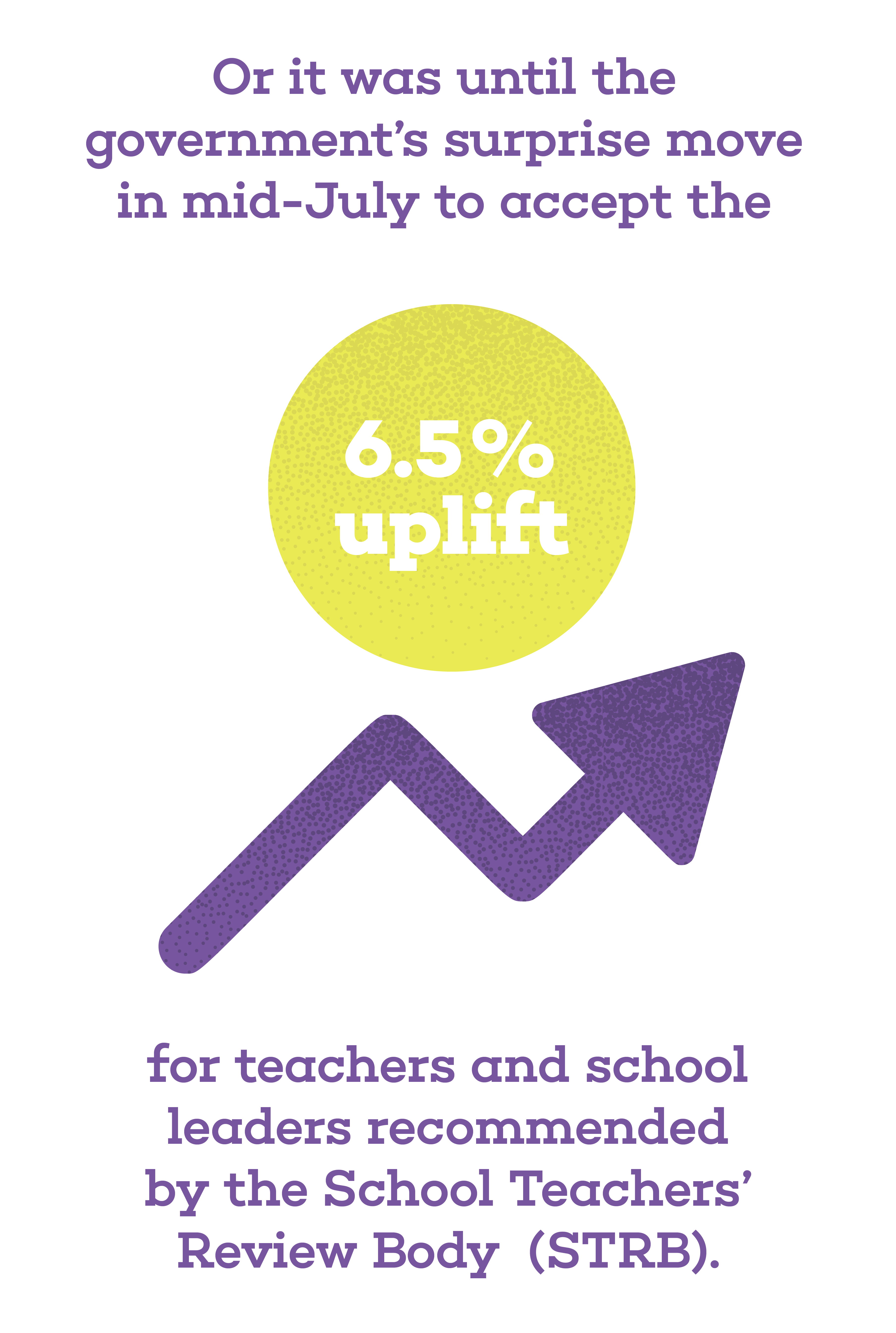
The key that unlocked things – and by all accounts after a considerable behind-doors battle between Keegan and the Treasury – was the acceptance within Whitehall that at least some new money needed to be put on the table as part of any refreshed offer ... even if schools will still have to find more than half (3.5%) of the uplift from existing budgets.

The result was that when the offer was put by NAHT to an online ballot in July, 85% of members voted to accept it, and industrial action was averted – at least for now.

PAUL WHITEMAN
NAHT GENERAL SECRETARY
However, as NAHT general secretary Paul Whiteman makes clear, if Keegan and the Department for Education (DfE) take from this that teachers and school leaders have somehow ‘blinked’ at the first sign of the government putting its hand in its pocket, they are very much mistaken.
This is because in the separate postal ballot on strike action that had been running since May – so initially before the offer was made – members made it very clear that without significant long-term change on pay, inspection and accountability, workload, and recruitment and retention, we may yet find ourselves back in a situation where battle lines are being drawn.
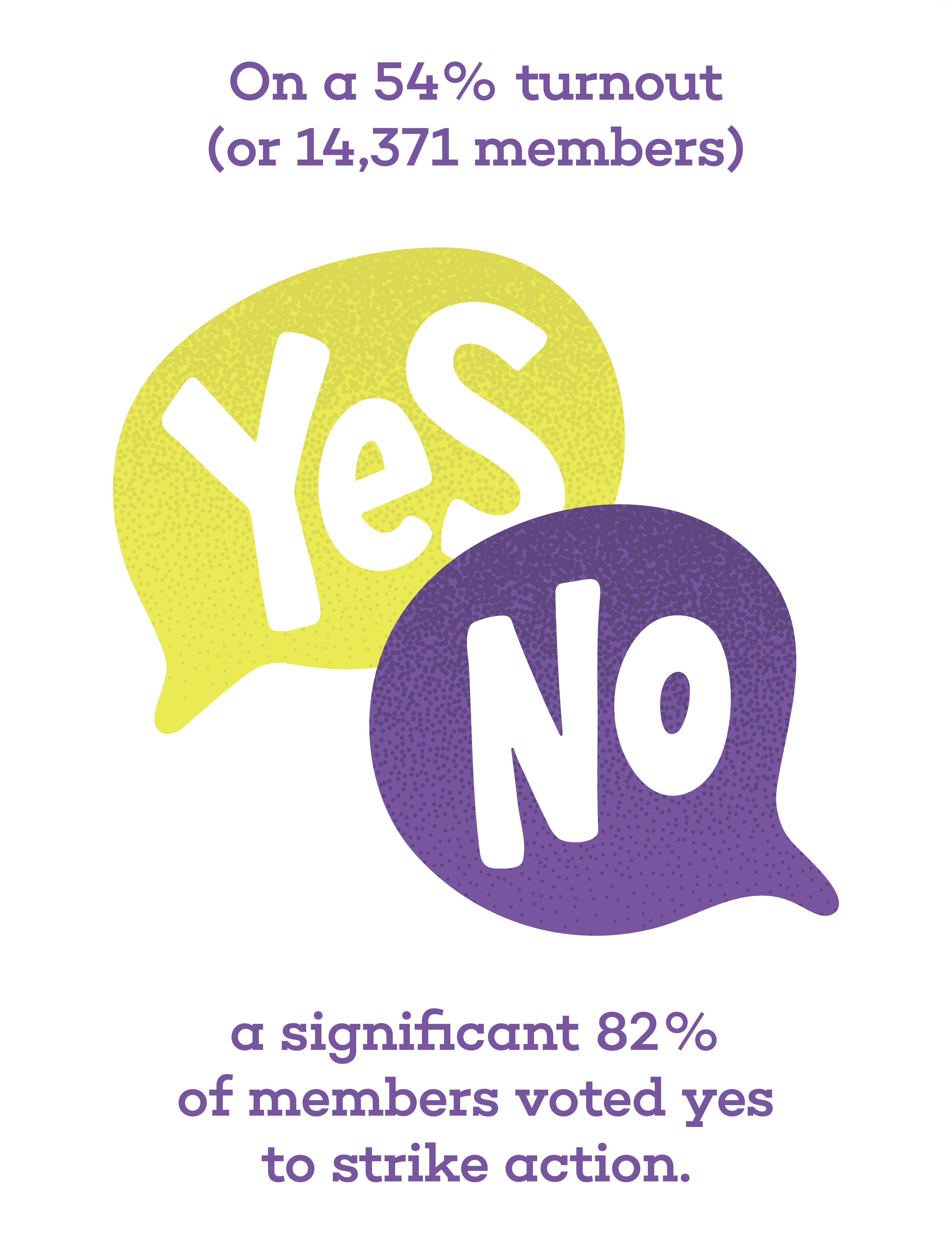
“It is really interesting because the dynamics have changed,” Paul tells Leadership Focus. “The government has always been able to rely on the fact that school leaders are, as we often like to say, ‘relentlessly reasonable’.

“We are always trying to find the solution. We carry on no matter what; we soak up the pressure. Senior leaders have never really been tested to the point where they would turn around and say, ‘Up with this, we will no longer put’.
“But, in the postal ballot, we have now crossed that emotional Rubicon and the government needs to take that very, very seriously. If the government has been successful in one thing, it has been in uniting the four education unions.
“I think that united front will continue now, beyond the immediate dispute, and I think that also needs to be taken seriously by the government,” he warns.
The government’s offer has, yes, been welcome, both in its substance and in the fact that it averts the prospect of significant disruption to children’s education this autumn – something no school leader wants.
Yet, at the same time, it is a one-year part-funded below-inflation deal that, in itself, does not address the longer-term erosion of school leaders’ remuneration since 2010.
While it commits to establishing a workload reduction ‘task force’, it does not resolve the ongoing recruitment and retention crisis at all levels within education or punishing workloads, especially for senior leaders. Nor, in the wake of Ruth Perry’s death, does it address the momentum building for reform of Ofsted, even if the deal has included a commitment to open talks “to review all aspects of inspection”.

To that end, while Paul emphasises that NAHT will engage positively with the government on all these areas in the coming weeks and months, this deal does not change the fundamentals of NAHT’s ‘four pillars’: its priority campaign areas of pay and funding, workload and well-being, recruitment and retention, and inspection.
“If anything, the four pillars campaign will be reinvigorated,” Paul says. “We will continue because we have not yet achieved all of our aims. So why would we stop? We will continue to campaign for funding. We will continue to campaign around the recruitment and retention crisis. We will continue to push for fair pay and pay restoration and for them to be properly funded. And we will continue to campaign for those changes to Ofsted.
“I think the government is entering these talks in good faith, but I’m always optimistic. If it is, then obviously, we will respond accordingly. The early indications are that it is taking this part of the deal to reduce workload seriously. It is taking accountability seriously after Ruth Perry’s death and all the campaign around that.
“Whether we will be successful in all that, only time will tell, of course. But at least we’re off to what looks like a positive start. With Sir Martyn Oliver coming in as the new chief inspector for Ofsted later this year, we will have the ability to talk to him about the impact of Ofsted; hopefully, we will get some human empathy and compassion,” Paul adds.




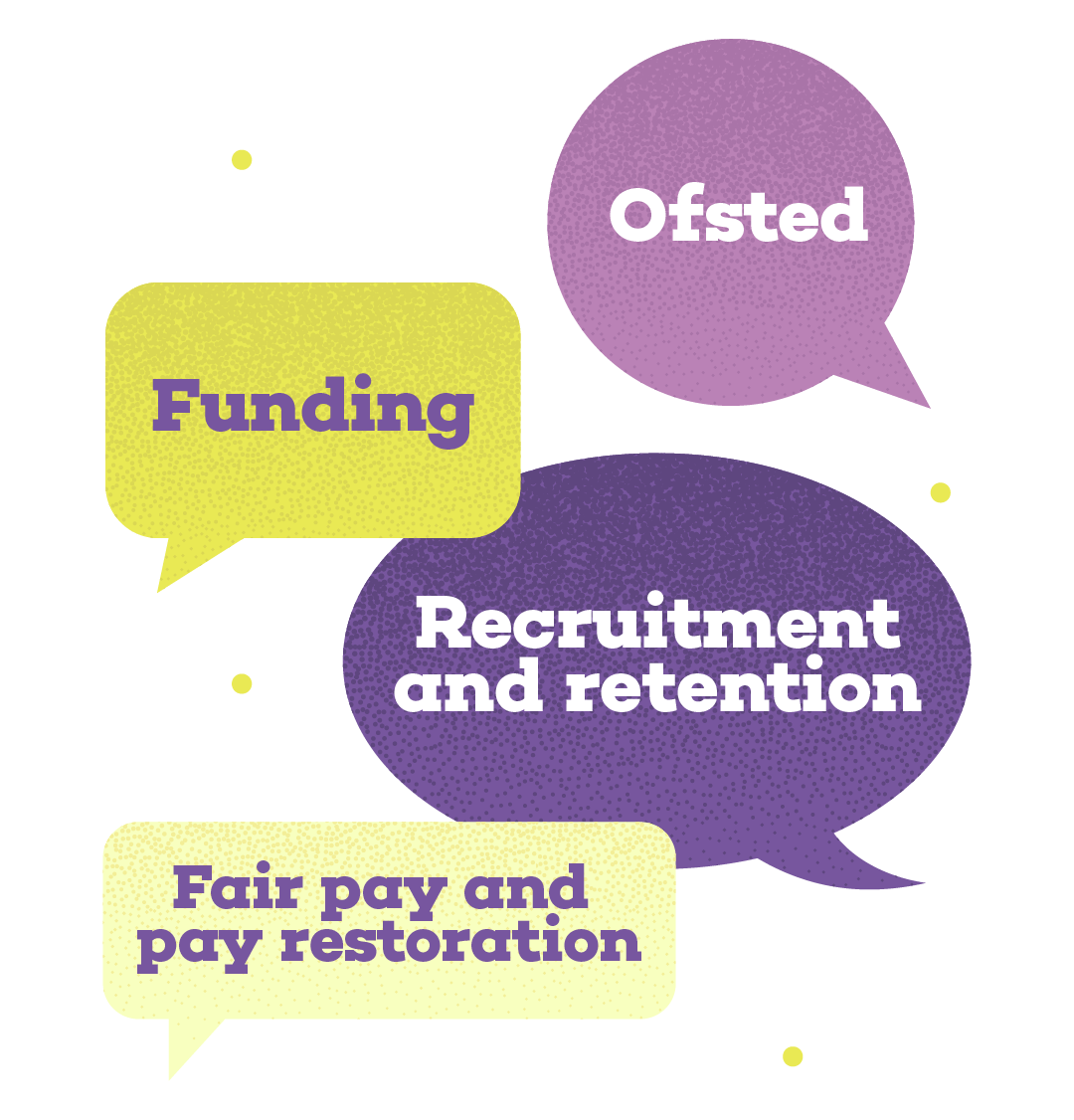
To that end, while Paul emphasises that NAHT will engage positively with the government on all these areas in the coming weeks and months, this deal does not change the fundamentals of NAHT’s ‘four pillars’: its priority campaign areas of pay and funding, workload and well-being, recruitment and retention, and inspection.
“If anything, the four pillars campaign will be reinvigorated,” Paul says. “We will continue because we have not yet achieved all of our aims. So why would we stop? We will continue to campaign for funding. We will continue to campaign around the recruitment and retention crisis. We will continue to push for fair pay and pay restoration and for them to be properly funded. And we will continue to campaign for those changes to Ofsted.
“I think the government is entering these talks in good faith, but I’m always optimistic. If it is, then obviously, we will respond accordingly. The early indications are that it is taking this part of the deal to reduce workload seriously. It is taking accountability seriously after Ruth Perry’s death and all the campaign around that.
“Whether we will be successful in all that, only time will tell, of course. But at least we’re off to what looks like a positive start. With Sir Martyn Oliver coming in as the new chief inspector for Ofsted later this year, we will have the ability to talk to him about the impact of Ofsted; hopefully, we will get some human empathy and compassion,” Paul adds.

JAMES BOWEN
NAHT ASSISTANT GENERAL SECRETARY
“It was clear from the industrial action ballot that the appetite is there from members to take action should they feel they need to. What we have demonstrated, as a union, is that we can organise in a way that means we can defeat the really high thresholds the government has set,” James Bowen, NAHT assistant general secretary, tells Leadership Focus.
“We have shown that we can get the turnout among our membership to take action should we need to. That is quite historic for us as a union. It shows the strength of feeling, commitment and determination of our members to demonstrate that enough is enough. And I have no doubt that was absolutely a contributing factor in the government coming back with an improved offer.
“I think the government was genuinely worried, and rightly so, that we and the other unions were going to cross that threshold. All four education unions taking industrial action this September, as was at one point looking very likely, would have been unprecedented. It looked like that was where all roads were heading,” James adds.
“The government, therefore, must not mistake members agreeing to this deal as them saying everything is OK now. We are a long way from that. What this vote was saying was, ‘This is enough for us to call off industrial action – for now’. But there are issues that still need resolving. All of our four pillars still need a great deal of work, including pay.
“We’re still in a place where we’ve got to work towards proper pay restoration in real terms; this deal is just a first step, as we see it. That, in turn, feeds into the recruitment and retention crisis, which is partly driven by pay, and that hasn’t gone away. And funding, I think probably for a lot of our members, remains the number one issue. There are still real and significant concerns about the systemic underfunding of schools, especially among our members in special and small schools,” James continues.

ROB KELSALL
NAHT ASSISTANT GENERAL SECRETARY
“I am convinced that had no offer been made, the 54% turnout in the postal ballot would have surged to more than 60%; there’s no doubt in my mind of that,” agrees Rob Kelsall, NAHT assistant general secretary.
“I think that just underlines how determined our members are to ensure all four pillars of this dispute are properly resolved. While the government may sigh a bit of relief in terms of the pay element of the deal, many of our members still have serious concerns about funding, accountability, workload, and the recruitment and retention crisis; therefore, the government has to deliver on all four pillars.
“I think the confidence of our members has grown considerably, particularly knowing that we can deliver on a successful industrial action ballot. From experience in other jurisdictions, I know that once you deliver a positive industrial action ballot, members will – if pushed to the brink again in England – deliver yet further mandates for industrial action,” Rob adds.







JAMES BOWEN
NAHT ASSISTANT GENERAL SECRETARY
“It was clear from the industrial action ballot that the appetite is there from members to take action should they feel they need to. What we have demonstrated, as a union, is that we can organise in a way that means we can defeat the really high thresholds the government has set,” James Bowen, NAHT assistant general secretary, tells Leadership Focus.

“We have shown that we can get the turnout among our membership to take action should we need to. That is quite historic for us as a union. It shows the strength of feeling, commitment and determination of our members to demonstrate that enough is enough. And I have no doubt that was absolutely a contributing factor in the government coming back with an improved offer.
“I think the government was genuinely worried, and rightly so, that we and the other unions were going to cross that threshold. All four education unions taking industrial action this September, as was at one point looking very likely, would have been unprecedented. It looked like that was where all roads were heading,” James adds.

“The government, therefore, must not mistake members agreeing to this deal as them saying everything is OK now. We are a long way from that. What this vote was saying was, ‘This is enough for us to call off industrial action – for now’. But there are issues that still need resolving. All of our four pillars still need a great deal of work, including pay.
“We’re still in a place where we’ve got to work towards proper pay restoration in real terms; this deal is just a first step, as we see it. That, in turn, feeds into the recruitment and retention crisis, which is partly driven by pay, and that hasn’t gone away. And funding, I think probably for a lot of our members, remains the number one issue. There are still real and significant concerns about the systemic underfunding of schools, especially among our members in special and small schools,” James continues.

ROB KELSALL
NAHT ASSISTANT GENERAL SECRETARY
“I am convinced that had no offer been made, the 54% turnout in the postal ballot would have surged to more than 60%; there’s no doubt in my mind of that,” agrees Rob Kelsall, NAHT assistant general secretary.

“I think that just underlines how determined our members are to ensure all four pillars of this dispute are properly resolved. While the government may sigh a bit of relief in terms of the pay element of the deal, many of our members still have serious concerns about funding, accountability, workload, and the recruitment and retention crisis; therefore, the government has to deliver on all four pillars.
“I think the confidence of our members has grown considerably, particularly knowing that we can deliver on a successful industrial action ballot. From experience in other jurisdictions, I know that once you deliver a positive industrial action ballot, members will – if pushed to the brink again in England – deliver yet further mandates for industrial action,” Rob adds.

The fact that we are entering a general election cycle – whether this coming spring, autumn or early in 2025 – makes this heightened appetite and impatience for change even more relevant.
Labour shadow education secretary Bridget Phillipson is confirmed to attend NAHT’s fringe event at the Labour Party Conference in Liverpool in October, while NAHT is hopeful Gillian Keegan will do the same in Manchester.
“We will be using the leverage members have given us in the ballot to demand delivery from politicians, both the incumbent government and any future government. Education really is the silver bullet to improving the life chances of the next generation, and politicians need to prioritise this as they develop their manifestos and spending commitments,” Rob emphasises.
It also means the next STRB pay round – and NAHT’s annual input into that – will be even more important in terms of whether the new momentum can be sustained or things will fall back into acrimony.

IAN HARTWRIGHT
NAHT HEAD OF POLICY (PROFESSIONAL)
“Very soon, members will have a pay, well-being and workload survey come to them,” points out Ian Hartwright, NAHT head of policy (professional). “And it is really important that you fill that in.
“We need a good response rate because it gives us really powerful evidence that we can use with the STRB. Your participation in that is an active part of our collective endeavour; the survey work is also very important as part of that collective work. It is another way of speaking to the government so that it hears clearly the authentic voice of school leaders; we will use those findings as a central element of our lobbying,” he adds.
“This autumn’s deal doesn’t restore pay; it is a step forward, but it is not the answer. All of our campaigning, our four pillars, remains. We mustn’t forget, too, that through the postal ballot, members endorsed strike action. It wasn’t about industrial action short of a strike.
“So, it is a clear line in the sand for ministers and officials at the DfE; things need to change. We’ve made a small amount of progress, a step forward. But we need to make a lot more. And that’s what we will be pressing the government to do,” Ian says.

SIMON KIDWELL
NAHT PRESIDENT
“The next STRB round will, I feel, be critical,” agrees NAHT president Simon Kidwell, who is also head teacher at Hartford Manor Primary School and Nursery in Hartford, Cheshire. “If pay doesn’t continue to progress, or even improve, from this year’s settlement – if we don’t start to see real pay progression and restoration – then I worry we could be in a very difficult place come next summer.
“For me, as well as pay, workload is a key issue we need to address. We have an ongoing crisis in terms of recruiting and retaining teachers at all levels. Pay is an important element of that, but tackling workload needs to be a central part of it, too. So, I look forward to seeing what the task force can deliver and to NAHT engaging proactively with that."
“Alongside this, we need to look at work-life balance, especially for younger colleagues. Teaching is very much a face-to-face career; for many, that is one of its attractions. But with so many other careers now offering more flexible home or hybrid working, we need to think about how to make teaching more flexible and sustainable,” Simon adds.

PAUL GOSLING
NAHT IMMEDIATE PAST PRESIDENT
“I think we should be proud that we managed to get the STRB’s recommendation implemented,” echoes NAHT immediate past president, Paul Gosling. “But we also need to accept that it doesn’t address many of the wider issues senior leaders still have beyond pay, especially in terms of workload and accountability.
“NAHT’s job over the next year, therefore, will be to hold the government’s feet to the fire over the commitments it has made on workload and inspection. To see if we can achieve some significant changes to the inspection framework and put some meat on the bones of what is required in terms of reducing workload. And, at the same time, fighting very hard for a pay award that begins to restore what has been lost over the last 12 to 13 years.
“If we’re not getting a sense that workload and inspection are changing, that will be a question we will probably be asking our members through an electronic ballot. And that, combined with a pay offer – if the government puts us back to 2% or 3% – could mean that by the spring, we are perhaps having to bare our teeth a bit,” Paul adds.



The fact that we are entering a general election cycle – whether this coming spring, autumn or early in 2025 – makes this heightened appetite and impatience for change even more relevant.
Labour shadow education secretary Bridget Phillipson is confirmed to attend NAHT’s fringe event at the Labour Party Conference in Liverpool in October, while NAHT is hopeful Gillian Keegan will do the same in Manchester.
“We will be using the leverage members have given us in the ballot to demand delivery from politicians, both the incumbent government and any future government. Education really is the silver bullet to improving the life chances of the next generation, and politicians need to prioritise this as they develop their manifestos and spending commitments,” Rob emphasises.
It also means the next STRB pay round – and NAHT’s annual input into that – will be even more important in terms of whether the new momentum can be sustained or things will fall back into acrimony.

IAN HARTWRIGHT
NAHT HEAD OF POLICY (PROFESSIONAL)
“Very soon, members will have a pay, well-being and workload survey come to them,” points out Ian Hartwright, NAHT head of policy (professional). “And it is really important that you fill that in.
“We need a good response rate because it gives us really powerful evidence that we can use with the STRB. Your participation in that is an active part of our collective endeavour; the survey work is also very important as part of that collective work. It is another way of speaking to the government so that it hears clearly the authentic voice of school leaders; we will use those findings as a central element of our lobbying,” he adds.
“This autumn’s deal doesn’t restore pay; it is a step forward, but it is not the answer. All of our campaigning, our four pillars, remains. We mustn’t forget, too, that through the postal ballot, members endorsed strike action. It wasn’t about industrial action short of a strike.
“So, it is a clear line in the sand for ministers and officials at the DfE; things need to change. We’ve made a small amount of progress, a step forward. But we need to make a lot more. And that’s what we will be pressing the government to do,” Ian says.

SIMON KIDWELL
NAHT PRESIDENT
“The next STRB round will, I feel, be critical,” agrees NAHT president Simon Kidwell, who is also head teacher at Hartford Manor Primary School and Nursery in Hartford, Cheshire. “If pay doesn’t continue to progress, or even improve, from this year’s settlement – if we don’t start to see real pay progression and restoration – then I worry we could be in a very difficult place come next summer.
“For me, as well as pay, workload is a key issue we need to address. We have an ongoing crisis in terms of recruiting and retaining teachers at all levels. Pay is an important element of that, but tackling workload needs to be a central part of it, too. So, I look forward to seeing what the task force can deliver and to NAHT engaging proactively with that."
“Alongside this, we need to look at work-life balance, especially for younger colleagues. Teaching is very much a face-to-face career; for many, that is one of its attractions. But with so many other careers now offering more flexible home or hybrid working, we need to think about how to make teaching more flexible and sustainable,” Simon adds.

PAUL GOSLING
NAHT IMMEDIATE PAST PRESIDENT
“I think we should be proud that we managed to get the STRB’s recommendation implemented,” echoes NAHT immediate past president, Paul Gosling. “But we also need to accept that it doesn’t address many of the wider issues senior leaders still have beyond pay, especially in terms of workload and accountability.
“NAHT’s job over the next year, therefore, will be to hold the government’s feet to the fire over the commitments it has made on workload and inspection. To see if we can achieve some significant changes to the inspection framework and put some meat on the bones of what is required in terms of reducing workload. And, at the same time, fighting very hard for a pay award that begins to restore what has been lost over the last 12 to 13 years.
“If we’re not getting a sense that workload and inspection are changing, that will be a question we will probably be asking our members through an electronic ballot. And that, combined with a pay offer – if the government puts us back to 2% or 3% – could mean that by the spring, we are perhaps having to bare our teeth a bit,” Paul adds.

Both Simon and Paul Gosling’s comments touch on the final question facing the profession: Given what has happened – both the acceptance of a deal and the, well, baring of teeth by members – where are we likely to be next spring or summer?
Obviously, if there is a general election between now and then, all bets are off in terms of what the profession can predict or expect. But, if significant progress hasn’t been made on pay, recruitment and retention, workload, and inspection then, equally, might we be back facing the prospect of an autumn or winter of discontent?
“For me, the key message is the campaigning does not go away; this is just a staging post in our ongoing campaign,” says James Bowen. “We will absolutely be reinvigorating the four pillars in the autumn. This is now as much about looking to the future as it is about the immediate present.
“Within 12 months, we will be looking at a general election, so it’s about building to that. It is about building on what we’ve achieved so far and not for a second saying, ‘This is it; job done’,” he adds.
“Number one, you can be proud of having stood up for yourselves, the profession, your communities and particularly the children and young people in your care,” agrees Rob Kelsall. “That mandate will send – and has sent – alarm bells ringing at the very heart of the government, hence the reason it came forward with an improved offer.
“It is vitally important we take forward that mandate and use it to press the government, both this government and any incoming administration, to deliver on the four key pillars of our dispute.
“That sense of purpose within our membership in terms of delivering that ballot, that sense of unity, we have to maintain that at all costs, not only within NAHT but across all of the teaching unions,” Rob adds.
For Paul Whiteman, however, his natural optimism is tinged with caution. “My experience of education’s history is that things are going to have to change soon. If we look at the fact that at least twice in the modern history of education, we’ve had to have a complete reset of salaries and then a complete commitment to education to bring it back up to standard before the government allows it to erode again. That has to be coming over the horizon soon.
“My worry, however, is will that be artificially delayed running into an election? We’re either going to get a reshaped Conservative administration, which, with its history around education, is not encouraging. Or, with Labour, it’s clearly going to need some time to understand the state of the economy and where its spending priorities will be. So, it is likely to be calling for patience from all public servants.
“Our job, therefore, will be to campaign hard with them too and to say, ‘Look, you can’t ignore education’. That if you do, it is a false economy. So, don’t leave us till last,” Paul adds.


Obviously, if there is a general election between now and then, all bets are off in terms of what the profession can predict or expect. But, if significant progress hasn’t been made on pay, recruitment and retention, workload, and inspection then, equally, might we be back facing the prospect of an autumn or winter of discontent?
“For me, the key message is the campaigning does not go away; this is just a staging post in our ongoing campaign,” says James Bowen. “We will absolutely be reinvigorating the four pillars in the autumn. This is now as much about looking to the future as it is about the immediate present.
“Within 12 months, we will be looking at a general election, so it’s about building to that. It is about building on what we’ve achieved so far and not for a second saying, ‘This is it; job done’,” he adds.
“Number one, you can be proud of having stood up for yourselves, the profession, your communities and particularly the children and young people in your care,” agrees Rob Kelsall. “That mandate will send – and has sent – alarm bells ringing at the very heart of the government, hence the reason it came forward with an improved offer.
“It is vitally important we take forward that mandate and use it to press the government, both this government and any incoming administration, to deliver on the four key pillars of our dispute.
“That sense of purpose within our membership in terms of delivering that ballot, that sense of unity, we have to maintain that at all costs, not only within NAHT but across all of the teaching unions,” Rob adds.
For Paul Whiteman, however, his natural optimism is tinged with caution. “My experience of education’s history is that things are going to have to change soon. If we look at the fact that at least twice in the modern history of education, we’ve had to have a complete reset of salaries and then a complete commitment to education to bring it back up to standard before the government allows it to erode again. That has to be coming over the horizon soon.
“My worry, however, is will that be artificially delayed running into an election? We’re either going to get a reshaped Conservative administration, which, with its history around education, is not encouraging. Or, with Labour, it’s clearly going to need some time to understand the state of the economy and where its spending priorities will be. So, it is likely to be calling for patience from all public servants.
“Our job, therefore, will be to campaign hard with them too and to say, ‘Look, you can’t ignore education’. That if you do, it is a false economy. So, don’t leave us till last,” Paul adds.

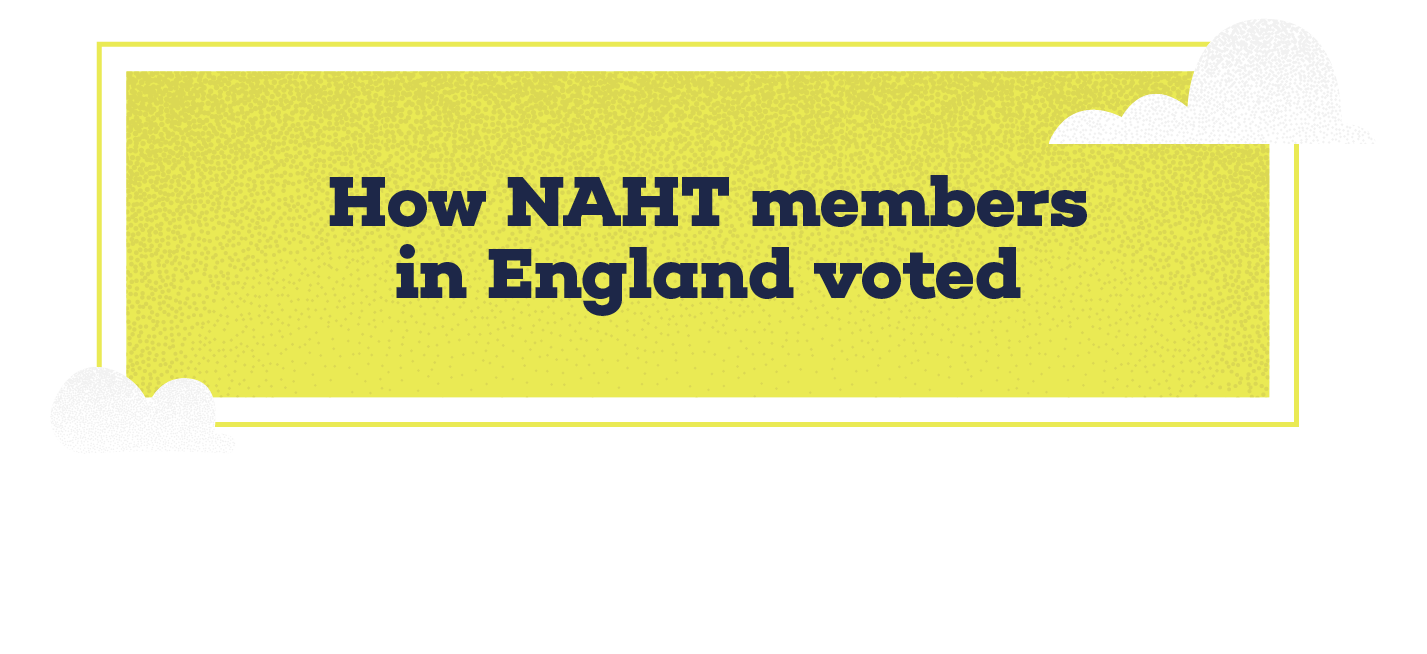
In an online ballot on the government’s offer, run between 17 and 28 July:
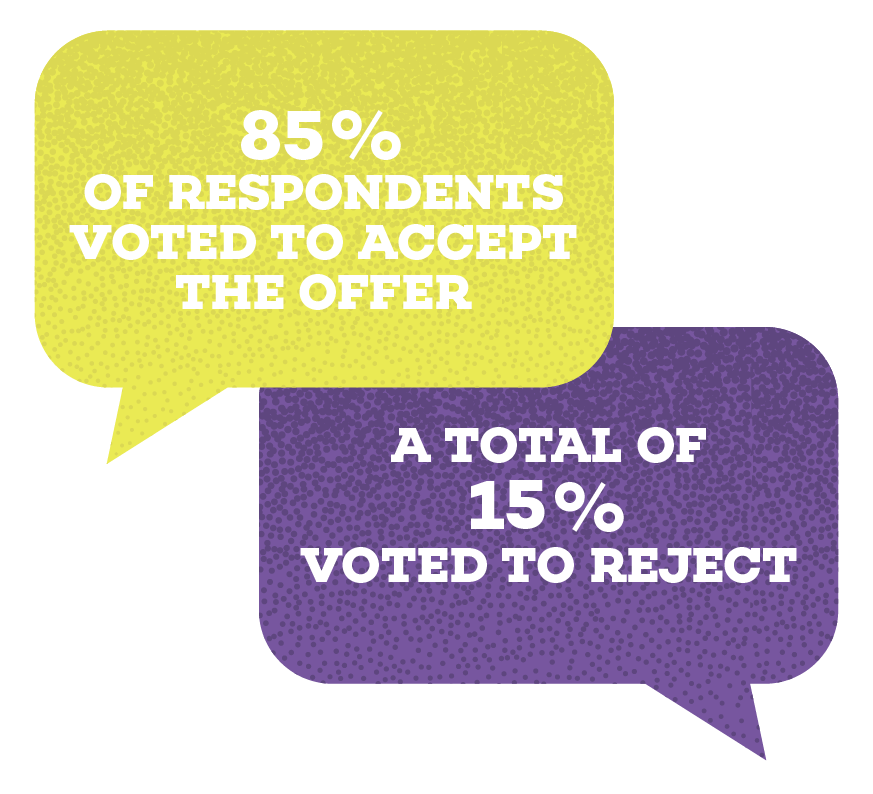
In the postal ballot on strike action, which ran from 15 May to 31 July and asked members, “Are you prepared to take part in industrial action consisting of a strike?”, 14,371 members voted – 54% (53.58%) of those eligible to vote.
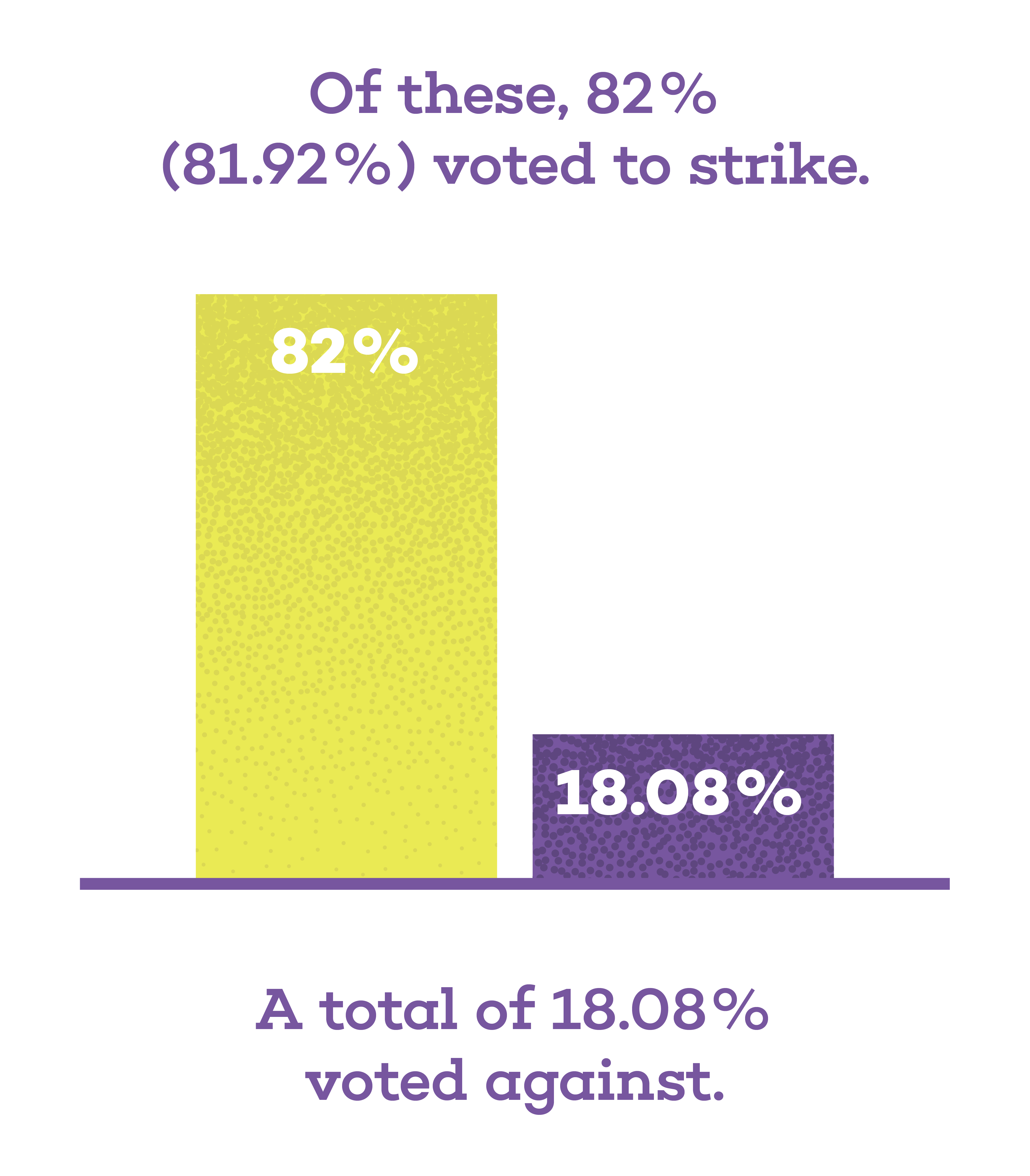

In an online ballot on the government’s offer, run between 17 and 28 July:

In the postal ballot on strike action, which ran from 15 May to 31 July and asked members, “Are you prepared to take part in industrial action consisting of a strike?”, 14,371 members voted – 54% (53.58%) of those eligible to vote.


While strike action has been deferred – for now at least – in England, it is important not to forget that the situation is very different in the devolved nations and crown dependencies.
In Jersey, for example, NAHT members joined colleagues in the NEU to take part in strike action on 12 September – the very first-time senior leaders on the island have taken this significant step.
As Rob Kelsall makes clear: “This was a first for our members in Jersey, as they strive to secure greater investment in the profession and ultimately the quality of education our children and young people so richly deserve.”
The latest action goes back to a ballot on industrial action held over the summer following the rejection of a 7.9% pay offer in May. This resulted in a resounding 86% of members voting in favour of strike action and 98% supporting action short of a strike.
This, in turn, led to action short of a strike taking place from the beginning of July, which included members withdrawing from submitting risk assessments, attending training, facilitating unsolicited school visits, receiving or responding to calls or emails from the government of Jersey or the Children, Young People, Education and Skills department before 8.30am or after 4pm, or attending meetings after 4pm, save for meetings related to matters of safeguarding.
The fact that the action has now expanded to full-blown strike action means the situation in Jersey is fast-evolving, so it will be an area of key focus for NAHT in the coming weeks and months.

While strike action has been deferred – for now at least – in England, it is important not to forget that the situation is very different in the devolved nations and crown dependencies.
In Jersey, for example, NAHT members joined colleagues in the NEU to take part in strike action on 12 September – the very first-time senior leaders on the island have taken this significant step.
As Rob Kelsall makes clear: “This was a first for our members in Jersey, as they strive to secure greater investment in the profession and ultimately the quality of education our children and young people so richly deserve.”
The latest action goes back to a ballot on industrial action held over the summer following the rejection of a 7.9% pay offer in May. This resulted in a resounding 86% of members voting in favour of strike action and 98% supporting action short of a strike.
This, in turn, led to action short of a strike taking place from the beginning of July, which included members withdrawing from submitting risk assessments, attending training, facilitating unsolicited school visits, receiving or responding to calls or emails from the government of Jersey or the Children, Young People, Education and Skills department before 8.30am or after 4pm, or attending meetings after 4pm, save for meetings related to matters of safeguarding.
The fact that the action has now expanded to full-blown strike action means the situation in Jersey is fast-evolving, so it will be an area of key focus for NAHT in the coming weeks and months.

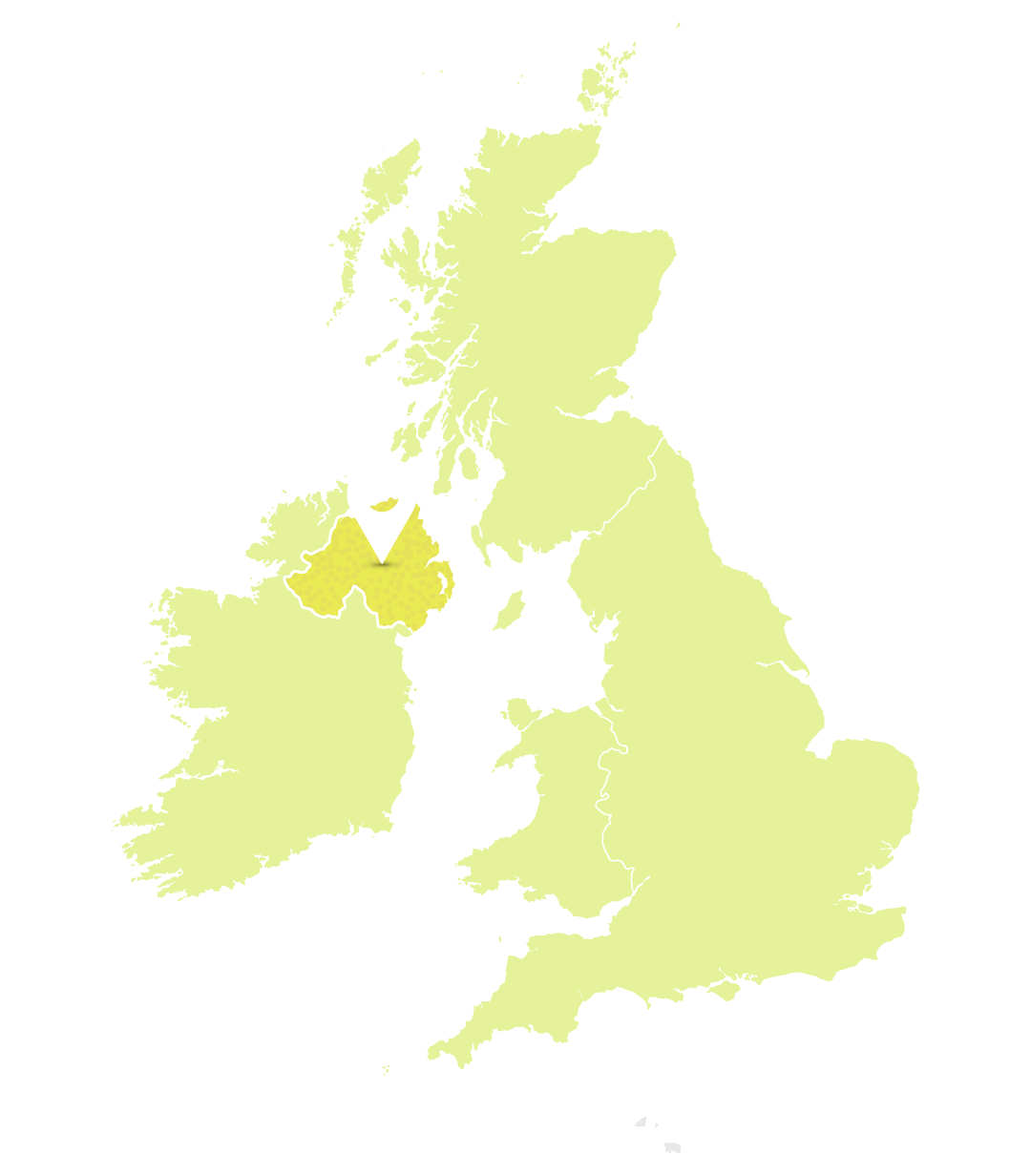
In Northern Ireland, a successful ballot last September for action short of a strike and including strike action led to industrial action from mid-October, which then escalated in the run-up to Christmas. In February, the other four Northern Ireland teaching unions walked out on a half-day of strike action.
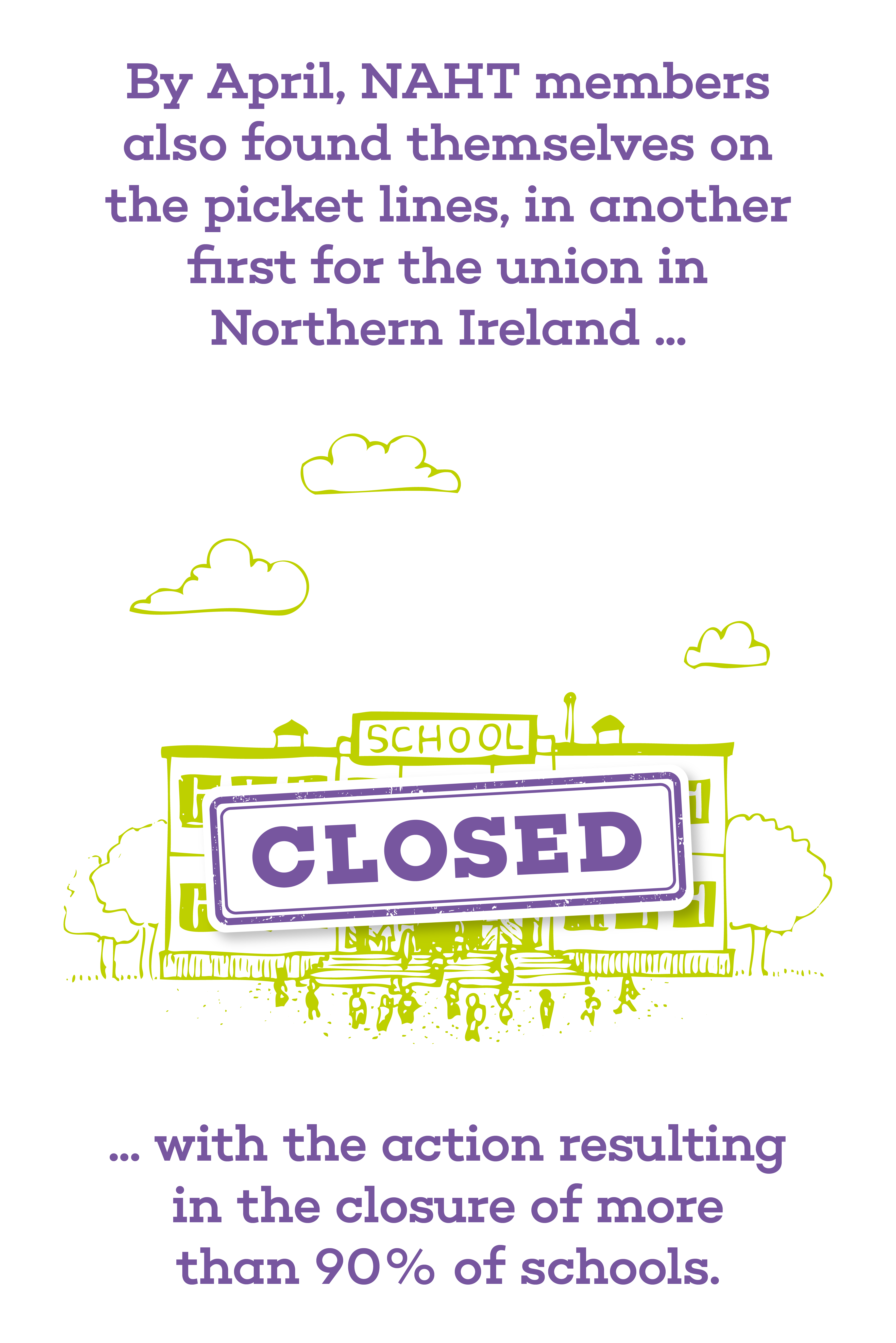
Approaching 15% of NAHT’s membership in Northern Ireland also gathered at a central rally in Belfast, a significant show of strength and solidarity.
The pressure is being maintained from this autumn, with NAHT at the end of August serving notice to the government and employers of increased action short of strikes.
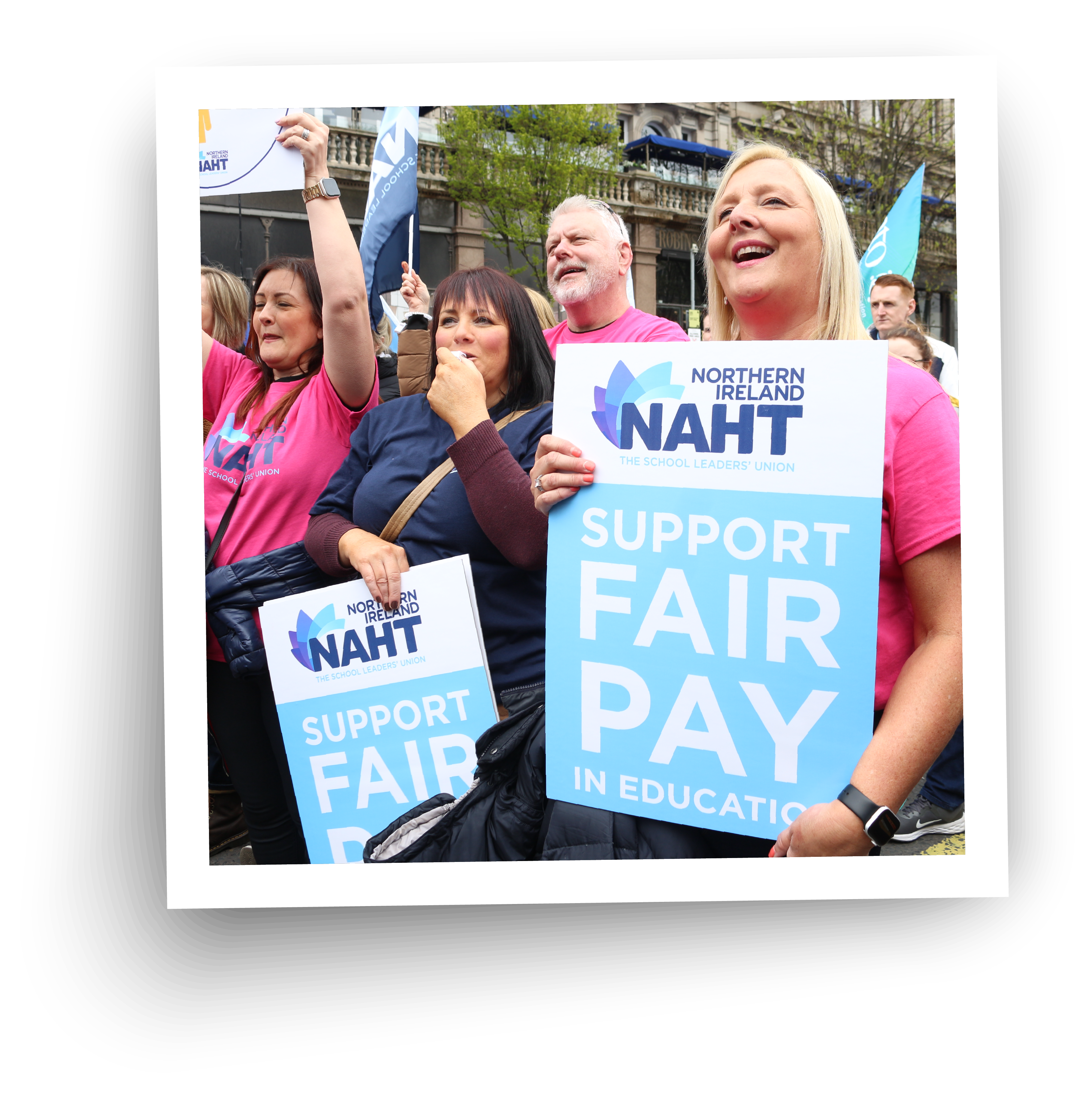
“The list of tasks that our members will be refusing to do for the government and employers will be intensified,” explains Rob Kelsall.
“There are some really powerful actions short of a strike that the members will be taking once the new academic year starts in Northern Ireland. It is very much about ratcheting up the pressure, a reinvigoration of our action short of striking.
“Our members continue with resilience, fortitude and intent, but also with a sense of frustration that school leaders in Northern Ireland seem to be so poorly valued by those who should be investing in the future of our schools and our children,” Rob adds.

The acceptance of the government’s offer in England does not change or affect the situation for senior leaders in Wales, where NAHT remains in dispute with the Welsh Government.
Industrial action in Wales began back in February with action short of a strike. This included members withdrawing from administrative duties, reporting to local authorities and the Welsh Government, participating in consultations, having meetings after 5pm, or answering emails or calls after 3pm.
This, in turn, prompted new negotiations with the Welsh Government and the offer of a new pay award from the middle of March. However, the additional 3% offer on top of the 5% recommended by the Independent Welsh Pay Review Body hit the buffers over the fact it was not fully funded.
A subsequent ballot of members firmly rejected the offer, leading to a second ballot on taking action, including the option of escalating to strike action.
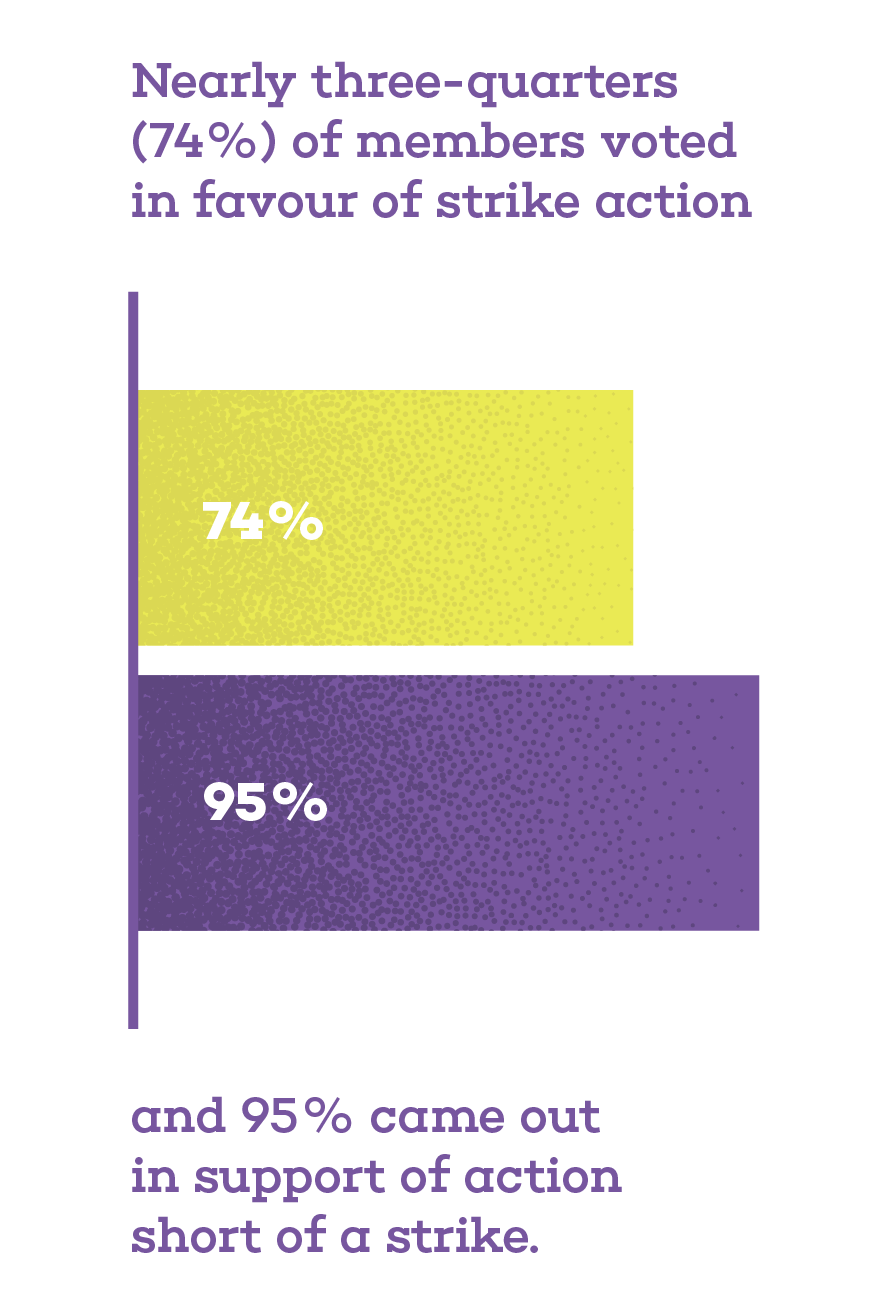

The acceptance of the government’s offer in England does not change or affect the situation for senior leaders in Wales, where NAHT remains in dispute with the Welsh Government.
Industrial action in Wales began back in February with action short of a strike. This included members withdrawing from administrative duties, reporting to local authorities and the Welsh Government, participating in consultations, having meetings after 5pm, or answering emails or calls after 3pm.
This, in turn, prompted new negotiations with the Welsh Government and the offer of a new pay award from the middle of March. However, the additional 3% offer on top of the 5% recommended by the Independent Welsh Pay Review Body hit the buffers over the fact it was not fully funded.
A subsequent ballot of members firmly rejected the offer, leading to a second ballot on taking action, including the option of escalating to strike action.
